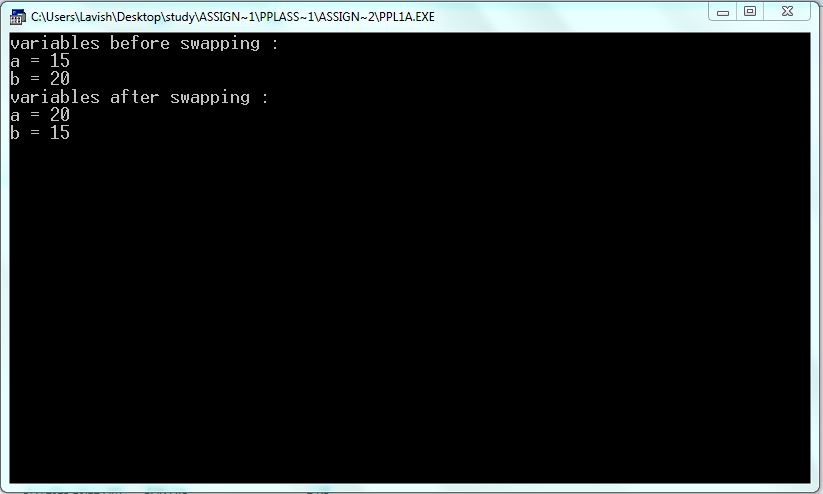POINTER VARIABLES
A pointer is a programming language data type whose value refers directly to (or "points to") another value stored elsewhere in the computer memory using its address.
A pointer variable (or pointer in short) is basically the same as the other variables, which can store a piece of data, but unlike normal variable pointers store a memory address.
DECLARATION OF POINTER VARIABLES
type *ptr;for example,
int *ptr;
here ptr is a pointer variable which points to an integer variable, or which stores the address of an integer variable.
Pointers are extremely powerful because they allow you to access addresses and manipulate their contents. But they are also extremely complex to handle.
To get the value pointed to by a pointer, you need to use the de-referencing operator
'*'For example to get the value of the
variable that is pointed by ptr, we need to use the *ptr in any expression.REFERENCE VARIABLES
A reference is an alias, or an alternate name to an existing variable.
A reference is similar to a pointer. In many cases, a reference can be used as an alternative to pointer, in particular, for the function parameter, at the place of formal arguments.
The main use of references is found in function formal parameters to support pass-by-reference. If a reference variable is passed into a function, the function works on the original copy (instead of a clone copy in pass-by-value mechanism). Changes inside the function are reflected outside the function.
C/C++
use
'&'
to denote the address-of operator in an expression. C++ assigns
an additional meaning to '&' in declaration statements to
declare a reference variable.
USING
‘&’ IN EXPRESSIONS
The
meaning of symbol
'&' is different in an expression
and in a declaration. When it is used in an expression, '&' denotes the address-of
operator, which returns the address of a variable, e.g., if ‘n’ is a variable of integer type,
then &n
returns the address of the variable n.USING ‘&’ IN DECLARATION STATEMENTS
When
'&' is used in a declaration (including
function formal parameters), it is part of the type identifier and is
used to declare a reference variable (or reference or alias
or alternate name). It is used to provide another name, or another
reference, or alias to an existing variable.
The syntax for creating a reference
variable is as follow:
type
&new_variable = existing_variable;
Remember that we need to initialize the reference variable
during declaration.
EXAMPLE :
/***********************************************************************************/
#include<iostream.h>
int main()
{
int
i=10; //i is a normal
variable
int
&j=i; //j is a
reference variable
int *k; //k is a pointer variable
k=&i; //k now points to i
//j is a reference of i
//k is
a pointer to integer that stores the address of i
cout<<"Address
of i = "<<(&i)<<endl;
cout<<"Address
of j = "<<(&j)<<endl;
cout<<"Address
of i (using k) = "<<k<<endl;
return
0;
}
/***********************************************************************************/
In the above program as we can see that the address of i is
same as that of address of j, which means the reference variable accesses the
same memory location as that of the original variable.
Also, printing the address of variable i using the pointer
k(which points to the variable i) prints the same address as that was
originally printed by using i. This
program clearly illustrates the properties of the pointer variable and the
reference variables.
PARAMETER PASSING BY
USING PASS BY POINTER TECHNIQUE
Consider the following
program to swap two number in which we create a function for swapping the two
numbers.
/****************************************************************************/
/*program in C++
illustrating the swapping of two numbers
using a function using pass by reference by pointer arguments
*/
#include<iostream.h>
#include<conio.h>
void swap(int*,int*);
int main()
{
int a,b;
a=15;
b=20;
clrscr();
cout<<"variables before swapping :
"<<endl;
cout<<"a = "<<a<<endl;
cout<<"b = "<<b<<endl;
swap(&a,&b);
cout<<"variables after swapping :
"<<endl;
cout<<"a = "<<a<<endl;
cout<<"b = "<<b<<endl;
getch();
return 0;
}
void swap(int *ptra,int
*ptrb)
{
int tmp;
tmp=*ptra;
*ptra=*ptrb;
*ptrb=tmp;
}
/****************************************************************************/
PARAMETER PASSING BY
USING PASS BY REFERENCE TECHNIQUE
/****************************************************************************/
/*
program in c++ to illustrate the swapping of two integers
using a function by implementing call by reference using
reference variables
*/
#include<iostream.h>
#include<conio.h>
void swap(int &,int
&);
int main()
{
int a,b;
clrscr();
a=15;
b=20;
cout<<"values of variables before swapping :
"<<endl;
cout<<"a = "<<a<<endl;
cout<<"b = "<<b<<endl;
swap(a,b);
cout<<"values of variables after swapping :
"<<endl;
cout<<"a = "<<a<<endl;
cout<<"b = "<<b<<endl;
getch();
return 0;
}
void swap(int
&refa, int &refb)
{
int tmp;
tmp=refa;
refa=refb;
refb=tmp;
}
/****************************************************************************/



No comments:
Post a Comment